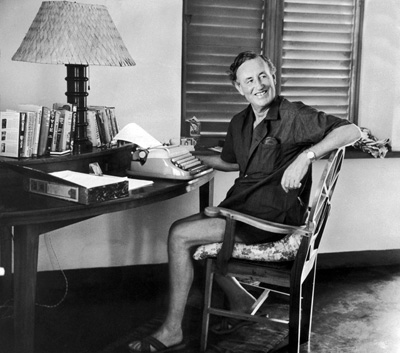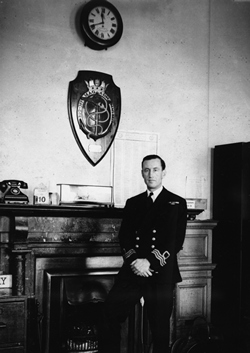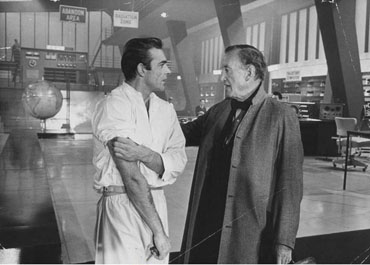|
This Charming Man - The Life and Times of Ian Fleming

Ian Fleming: the Man Behind James Bond by Andrew Lycett is a
comprehensively researched - with hundreds of interviews and direct
access to Fleming's papers - and very readable trawl through the life
and times of the suave 007 author and contains a number of fascinating
details about the inspiration behind his famous fictional creation and
to what extent Bond's character traits derived from Fleming's own life,
tastes and attitudes. The young Fleming was a rather aimless and
bohemian character for a while according to Lycett, wafting around the
pre-war world on his travels with private money and becoming at one
point 'the world's worst' stockbroker. But he quickly acquired the
expensive tastes and habits that would play such a prominent role in
the books that eventually made him famous. Born in London on May 28th,
1908, Fleming attended Eton and Sandhurst but underachieved
academically and failed the Foreign Office exams, eventually turning to
journalism and joining the Reuters news agency in 1931. On assignment
in Moscow, Fleming developed a fondness for vodka and caviar and
established contacts with British intelligence. The seeds of James Bond
were slowly starting to be sown.
The fleshing out of Fleming's background is perhaps rather a slog on
occasion while we wait for the James Bond years to enter the biography.
There is much social detail about who Fleming drank with or played golf
with but the biography picks up when war breaks out in 1939 and Fleming
joins the Naval Intelligence Division to become an SIS operator.
Although his activities were often far duller than anything 007 endured
on his own colourful adventures, Fleming loved this world of intrigue
and espionage and built up a store of information and characters to
deploy in his subsequent literary Bond series. 'Bond," says Andrew
Lycett. 'Gave at least fictional form to Ian's frustrated urge to have
been a full-time secret agent, rather than a competent staff officer
sitting, office-politicking and dreaming in Room 39 of the Admiralty.'
Fleming later met with John F Kennedy to discuss plans to embarrass
Castro and induce his slide from power and during the war was in charge
of 30 Assault Unit, a commando force that was deployed behind German
lines. He also advised the United States on setting up the OSS, the
precursor to the CIA and by the end of the war Fleming was a Commander,
just like James Bond. 'War,' writes Lycett. 'Proved his making.' In the
final months of the conflict Fleming is promising his friends that one
day, with his expert knowledge, he is going to write the spy story to
end all spy stories.

Fleming was a bit of a carefree bounder, seducer and caddish bon vivant
according to Lycett but is eventually haunted by the death of a
girlfriend - that he wasn't very nice to at all - in the Blitz. 'The
trouble with Ian,' says a friend. 'Is that you have to get yourself
killed before he feels anything.' To Fleming, women were - 'remote,
mysterious beings whom you will never hope to understand but, if you're
clever, you can occasionally shoot one down.' The book has a vaguely
downbeat quality in that Fleming doesn't come across as someone who was
always very nice or terribly happy although Lycett tries to temper the
largely unflattering portrait once or twice by highlighting his more
admirable sides. 'He was in so many ways an agreeable man - good
company, surprisingly thoughtful (when he could be bothered), and,
despite his tendencies to moroseness, with a remarkable capacity for
friendship.' Fleming's dysfunctional relationship with his mother Eve
is suggested to explain the charges of misogyny in some of his work.
His most important relationship was with Anne, the wife of Viscount
Rothermere. They lost a child together and then married a few years
later, the marriage dulling the excitement of their formerly
surreptitious liaisons. 'Rothermere could not compete with Ian's easy
unctuousness,' writes Lycett. Fleming was soon involved in another
affair, as was Anne with none other than Labour leader Hugh Gaitskell.
In 1952 he drew on his wartime experiences and began writing a spy
novel called Casino Royale about a British secret agent called James
Bond - the 'ordinary' name taken from the author of the book Field
Guide to the Birds of the West Indies. On a bottle of gin a day at his
GoldenEye retreat in Jamaica, where Noel Coward was his neighbour,
Fleming rattled out the Bond books on his typewriter with their exotic
mixture of sex and sadism in far flung places and elaborate
journalistic detail soon attracting readers looking for escapist fare
in the austerity of the era. Lycett does a good job in taking us into
this sun drenched orbit and social circle as Fleming's new endevour
changes his life and becomes an enduring and indestructible part of
popular culture. According to Lycett Fleming yearned for critical and
intellectual approval and the beginning of the James Bond series of
films - with their glossy sheen and abundant technology - made him feel
less likely to be taken seriously as a writer. It's a little ironic
really when one considers how famous and known Fleming would be today
without the cinematic adventures of James Bond. Would many people even
read Fleming today were it not for Albert Broccoli and Harry
Saltzman?

Like Arthur Conan-Doyle, who even tried to kill off Sherlock Holmes,
Fleming became increasingly cheesed off with his legendary fictional
creation and the process of writing the books, leading to some
experimentation (The Spy Who Loved Me) and occasional lapses and
inconsistencies in continuity and specific character traits. The
origins of some of Bond's habits or attitudes are always interesting in
the biography. Fleming, for example, thought that stirring drinks
damaged the flavour hence Bond's familiar shaken not stirred mantra
when ordering his iconic vodka martini. The reflective tone that
entered the later Bond novels echoed Fleming's own increasing sense of
mortality. He drank too much and smoked too much and was far too fond
of rich luxury foods, meats and butter, suffering increasing heart
problems - which the knotty case over the rights to Thunderball didn't
help. In the end it was a price Fleming seemed willing to pay.
Like Bond, Fleming couldn't be Fleming without his taste for the high life.
- Jake
c 2009
Alternative 007
|

|



